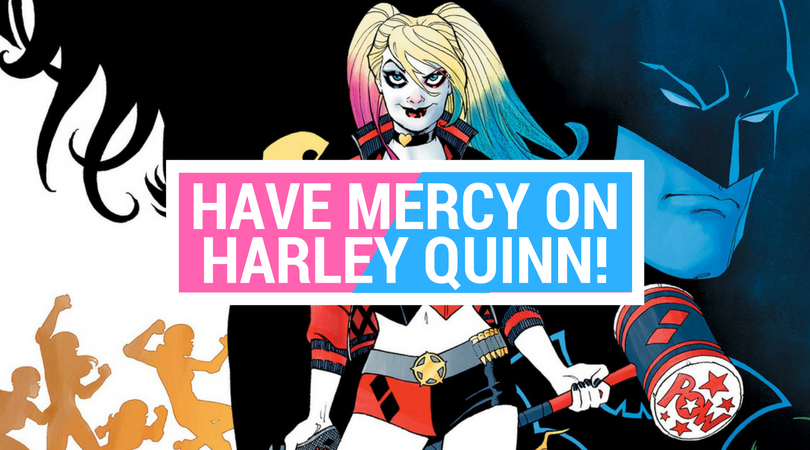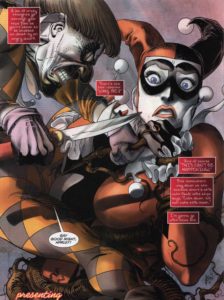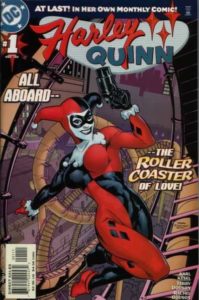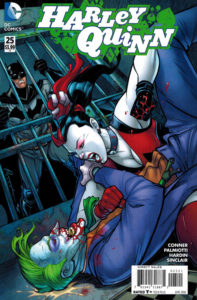
Happy 25th, Harley Quinn!
Harley Quinn is an interesting character as one of the most popular female villains. In the 90s — even the early 00s — I would have said Catwoman filled this role, for her solo films and constant appearances in movies. For the past couple of years, Harley’s popularity has been growing. I would say that she is arguably the most cosplayed female villain. People love Harley Quinn and are attached to her. And she has only been around for 25 years.
I understand the appeal. Harley Quinn is both quirky and serious, and her start in the comics lore is evident. Nearly everyone knows her first appearance was in Batman: The Animated Series when she was driven insane by the Joker. Or you may like the idea that she was thrown into acid by the Joker (I don’t!). She is one of the villains that many can get a handle on easily and has her own series in comics today.
What I notice about the fans, though, is their obsession with Harley’s characterization. Sure, she has an interesting relationship with the Joker (read: toxic). Sure, she is a powerful anti-villain who’s smart and badass. But Harley Quinn is still a victim in a lot of her stories. So maybe have mercy and stop victimizing her?
 Let’s take this example: Gotham City Sirens by Paul Dini, Tony Bedard, Scott Lobdell, and Marc Andreyko.
Let’s take this example: Gotham City Sirens by Paul Dini, Tony Bedard, Scott Lobdell, and Marc Andreyko.
Despite the all-male creative team, the women in this narrative are pretty well developed. The story is fun, as well. In the first volume, there is a storyline with Harley in the limelight. Gaggy, the Joker’s former sidekick, impersonates him and targets her. He makes her a victim in this story. Despite her history of being a psychiatrist, the narrative strips Harley Quinn of her intelligence. She continuously praises a man who abuses her and does not realize that she is in eminent danger from a man in disguise.
Furthermore, Gaggy assumes that his rightful place at the Joker’s side has been taken by a woman. He blames her. Gaggy blames the victim, Harley Quinn, for replacing him in a job at which he was barely competent. Sounds familiar? The difference is that all these characters are villains, so it would be counterproductive if a hero comes and saves her. So a male superhero does not save her; it is Catwoman and Poison Ivy who do, even before Harley realizes that she is in trouble.
Let me reiterate: they are all considered villainous in this narrative. So, what do we make of their feminist or positive actions? I read it as vilifying feminism (or precisely the act of encroaching on male territory). But, it can be interpreted as a woman taking their destiny into their own hands. Either way, Harley Quinn is still a victim.
 Let’s try another example: Harley Quinn by Karl Kesel, Terry Dodson, and Rachel Dodson.
Let’s try another example: Harley Quinn by Karl Kesel, Terry Dodson, and Rachel Dodson.
In the first issue of this series, Harley frees the Joker. Then, he turns around and attempts to kill her. This dynamic between the characters is frustrating. The love/murder relationship they have is overrated and abusive. The joker shows her love and affection when he needs her. When he doesn’t, he hurts her, badly. Or he attempts to kill her. In this comic, Poison Ivy warns Harley, but she doesn’t listen. So in order to placate each other, they decide to manipulate the Joker to figure out his plan. To Harley’s dismay, his true murderous colours are revealed. She is again a victim of a man she loves.
Harley Quinn is constantly victimized even though she is intelligent and capable. Harley should not have needed Poison Ivy to point out that she is not in a healthy relationship. She also should be smart enough not to fall for the same thing again in Gotham City Sirens. However, she does. This dismisses her ability to grow as a character and as a villain. It also diminishes her independence.
 Recently, Harley Quinn by Amanda Conner, Jimmy Palmiotti, Chad Hardin, and Stephane Roux has come to save her, as a character.
Recently, Harley Quinn by Amanda Conner, Jimmy Palmiotti, Chad Hardin, and Stephane Roux has come to save her, as a character.
In issue #25, Harley finally puts the Joker in his place. Of course, he attempts to victimize her again. However, she puts him in his place in the most satisfying way possible, emancipating herself, finally! So we finally have some mercy on her characterization. But, I’m NOT going to spoil this one, ’cause if you read this far, then you probably want to read it yourself!
In the end, I want to ask: After 25 years, when will we have mercy on Harley Quinn, and let her be purely villainous (to be brought down by the hero)? Or, when will we let her be her own hero?
I am tired of seeing her used by various entities, like Suicide Squad, or victimized by her current or former relationship with the Joker. I know there are other stories out there featuring Harley without these specific scenarios, but many still enjoy exploring her as an anti-hero or in connection to the Joker.
Seriously, I am willing to read a comic about her collecting pets and being happy with Poison Ivy, or trying to rule Gotham with Poison Ivy and Batman defeating her. Yes, I am hinting at the last series I mentioned. Seriously, if you want a Harley Quinn story where she takes her life into her own hands, that’s the one to read!



![[REVIEW] MAGIC, TATTOOS, AND BELONGING IN ‘THE MARKED #1’](https://geekd-out.com/wp-content/uploads/2019/10/The-Marked_01_CVR_A_c6815a0147f8285e3b5042ebb3626151-150x150.jpg)